#does poverty play a role
Note
beer killed my father . he had a disease which destroyed his body and strained his relationships with his wife, his friends, and his children. Alcohol destroys everything it touches, theres a reason you see so many liquor stores in poor neighborhoods. don’t be fucking obtuse. Prohibition obviously doesn’t work, but I wish alcohol was taxed higher. And i want the CEO of Heineken on the guillotine right after Jeff Bezos.
before anything, i want to let you know that i am incredibly sorry about your father. alcohol has decimated entire generations of my family, played a crucial role in the neglectful family structure i spent the first 19 years of my life suffering under, + played a minor but not insignificant role in my brother's death. i would never undermine or dismiss that in anyone.
i used to feel very similarly to you, in large part because my mother is a recovering alcoholic who raised me to believe that alcohol is a magic poison which turns people into monsters + i, being her child, probably inherited a disease which would also turn me into a monster if i chose to drink. it's a deeply painful + understandable response to the pain that alcohol can cause.
my first question is, does alcohol really "destroy everything it touches"? are there not millions of people who engage with alcohol, in varying degrees of recreational use, who experience minimal or no negative impacts? or do you believe that everyone who drinks alcohol in any capacity is experiencing severe destruction in their lives as a result? does the existence of people for whom alcohol enriches their lives (or is a neutral presence) at all invalidate your experience, or your father's?
my second question is, you've identified that there are 'so many liquor stores in poor neighborhoods' (i would add there is a lot of alcohol in rich neighborhoods, just distributed in less stigmatized ways, like boutique wineries + fancy bars), do you think that companies are strategically attempting to create alcohol dependencies among poor people, or do you think that poverty creates the pain, hopelessness, + desperation which can fuel an alcohol habit (which is then exacerbated by intergenerational trauma + community alcohol culture).
i feel no allegiance to liquor companies- they absolutely do make the bulk of their profits off of people who are drinking in a way that is destroying their lives (unsure if i trust the exact scope of the research in that link but i trust the gist). however, liquor companies love the disease model, because it exempts them from responsibility. if alcoholism is truly a genetic disease, then liquor companies, bars, package stores hold no fault in the development of destructive drinking habits + community norms (natasha Schüll discusses this in her book about gambling addiction)- the people were already sick + would be getting it somewhere else, anyway, right? but as you have correctly identified, liquor companies help create the structures which turn alcohol use into an accessible + normalized mode of self-destruction.
my third question is, will taxing liquor help the real problem? yes, it reduces alcohol consumption, but does it reduce addiction? or does it make cheapskates like me say "i'm not fucking paying for that" while individuals who consume alcohol compulsively either eat the cost or turn to more illicit ways of obtaining alcohol. or, rephrased, is the problem that alcohol is too accessible? is alcohol a magical poison which turns 'normal' people into 'alcoholics'? alternatively, is alcoholism a genetic condition, unrelated to any outside circumstances, which is triggered by drinking?
or: is alcoholism one of many ways in which people who are experiencing hopelessness, pain, grief, poverty, trauma, etc use to numb themselves, harm themselves, + make life feel more bearable? at this point, i do believe there is at least a temperament factor which makes people more likely to use substances over other forms of escape (hence why my brother used substances while i turned to anorexia + do not struggle with substance use). are we actually addressing the problem if we make it more expensive (thus, mind you, further impoverishing people with alcohol addictions!)? or are we shifting the pain these people are experiencing to either other avenues (opioids, other drugs, totally different ways of coping which are often just as destructive) or an unregulated, underground alcohol market.
the way you are viewing alcohol, alcohol is a unique substance which is manufacturing or feeding illness in people in order to make them behave in ways which destroy their lives + the lives of others. the way i am viewing it, alcohol is a presence which can fill a void that is being created in people's lives as a response to structural, communal, or social suffering. when alcohol is painted as the cause of this pain, we are able to look the other way from a which world is structured to cause an immense amount of people to suffer needlessly. at the same time, the common sense observation that many of us engage with alcohol in ways which do not destroy our lives, as well as the knowledge that prohibition does not work, prevents the erasure of alcohol from public or private life.
who benefits from the belief that alcohol is a uniquely corrupting substance? what lessons did we actually learn from prohibition- is trying to do it to a lesser degree (make alcohol less accessible) actually going to do anything? when the price of opioids went up due to dea crackdowns, did people stop buying opioids or did the market flood with cheap + deadly fentanyl? is the problem that people are drinking or that they are suffering?
1K notes
·
View notes
Text
I'm definitely going to downsize the account with the intent of eventually deleting it—Pinterest has been a thorn in my side for years. However, I do have some big collections of quotes, creative ideas, character face claims, and other things there that I feel are useful.
First collections to go will be the external links & resources since many are dead or weren't good to begin with. I will keep those up until end of this poll (week) for anyone who wants to fave them.
Collections on the immediate chopping block are linked below!
Also, in part, I would like to remove as much art from my inactive accounts as possible. I know I can't stop Big AI from scraping Pinterest, but I can at least not leave a ton of unprotected (and often uncredited) stuff out in the open. It's simply a sentimental thing at this point.
Save whatever you want and support the artists if you can!
#writing#writers on tumblr#writeblr#last chance#pinterest#poll#writing links#writer resources#writing poll#writing resources#writing inspiration
264 notes
·
View notes
Note
I read your review of Poor Things and I was wondering if you had any thoughts on the section in Alexandria? It was horrifically executed on many levels but narratively, that part of the film is about Bella learning about class structure. She rebels against the cruelty of society through charity then by working as a prostitute, during which time she has cruelty inflicted upon her instead. Finally, she realizes that God’s creation of her was ultimately cruel, and then she runs away with her ex-husband-father only to realize that her prior self-mother was fundamentally characterized by cruelty, especially to her “lessers.” She then decides once again that she does not want to be cruel, but then she achieves this by taking God’s place as the doctor-patriarch and ruling his household with a new pet goat. The entire film is also about Bella learning about feminism: the arbitrary oppression of women is not only nonsensical, it’s bad! But then the ending has her reproduce almost all those power structures and cruelty she claims to reject, and has the unfortunate consequence of positioning her as ultimately equally cruel/callous as God, the guy she meets on the boat who shows her all the starving people, and her former self-mother, etc. I was wondering if you had any thoughts on why this is or like, what the director’s message was beyond self-contradiction and taking cheap shots at starving people?
so i would quibble a bit with the idea that bella's experience in the maison-close is exclusively or even primarily portraying sex-for-pay as a site of cruelty. i think it's more depicting paid sex as work, and work as unpleasant and repressive, and that's why the maison is the site where bella gets involved in socialist politics—if moral philosophy is the arena by which she responds to the injustice of the poverty in alexandria, then labour politics plays the analogous role where the maison is concerned. her problems there aren't inherently with the idea of being paid for sex, but with specific elements of the work arrangement (eg, she suggests that the women should choose their clients, rather than vice versa). ofc she has some customers who are cruel or thoughtless or rude, but i didn't read the film as suggesting that was universal to sex work, and the effect of the position is more to demystify sex, for bella, than to convert it into being purely a site of trauma or misery. now i don't think this film offers a particularly blistering or deep analysis of sex work or socialism or wage labour, dgmw, but i do think the function of the maison is different narratively to that of the alexandria section.
anyway to answer your actual question: yeah so this is really my central gripe with the film. lanthimos (slash his screenwriter tony mcnamara) spends much of the film gesturing toward bella's growing awareness of several hierarchical structures that other characters take for granted: the uneven nature of the parent/child relationship (god took her body and created her without asking); class stratification (alexandria); the 'civilisation' of individuals and societies via education and bio-alteration (bella's talk about 'improving' herself; her 'progression' from essentially a pleasure-seeking child to an educated and 'articulate' adult). these three dimensions often overlap (eg, the conflation of 'childishness' with lack of education with inability to behave in 'high society'), though, most overtly, it's in that third one that we can see how these notions of improvement and biological melioration speak to discourses about the 'progress' and 'regress' of whole societies and peoples, and voluntarist ideas about how human alteration of biology (namely, our own) might produce people, and therefore societies, that are better or worse on some metric: beauty, fitness, intelligence, morality, longevity, &c. this is why i keep saying that like.... this film is about eugenics djkdjsk.
the issue with the alexandria section to me is, first, it's like 2 minutes (processed in the hollywood yellow filter) where the abject poverty of other people is a life lesson for bella. we're not asking any questions like, how is that poverty produced, and might it have anything to do with the ship bella is on or the fantastical lisbon she left or the comparative wealth of paris and london...? secondly, everything that the film thinks it's doing for the entire runtime by having bella grapple with learning about cruelty, and misery, and the kinds of received social truths that lanthimos is able to problematise through her eyes because she's literally tabula rasa—all of that is just so negated by having an ending in which she bio-engineers her shitty ex-husband, played as a triumphant moment. i don't even inherently have an issue with the actual plot point; certainly she has motive, and narratively it could have worked if it were framed as what it is: bella ascending to the powerful position in the oppressive system that created her, and using her status to enact cruelty against someone who 'deserves' it—ie, leveraging her class and race within the existing social forms rather than continuing to question or challenge them. if that ending were played as a tragedy, or a bleak satire, it would at least be making A Point. but it's not even, because it's just framed as deserved comeuppance for this guy we were introduced to in the 11th hour as a scumbag, so it's psychologically beneficial for bella actually to do the sci-fi surgery to him that literally reduces him to what's framed as a lower life form. unserious
#the favourite and the lobster also have some troubling body and disability politics and i think this is a throughline with lanthimos#but this one is particularly egregious to me given the ending lol#poor things
209 notes
·
View notes
Text
WHERE Malleus falls for his gardener's one and only child, and promises to protect them for the rest of his life.
GENDER NEUTRAL READER

Malleus found significant comfort in your arms, the weight of your body felt heavy on his chest as he tightened his grip on your waist, refuting the idea of letting you go.
It was at this time where Malleus reminisces about the two of your first meeting, how he fell for you in the first place.
Malleus remembers getting injured, he can't quite remember how as his memory blurs when he tries to relocate the memory, however he does recall the fact that he was upset with his tutors and Lilia at the time, so he ran off in the palace garden to catch a breather.
That's when he caught you, picking the plants from the garden and placing them in a woven basket ever so carefully, each movement careful. He was mesmerized by each movement, his gaze locked onto your form.
Later he found out that you were the palace gardener's one and only child, and that you were covering for your mother, who had fallen ill.
At that moment little Malleus thought 'Was that an angel', his childish and naive mind couldn't comprehend how someone his age could take up such a hefty job for their parents.
The idea of poverty was foreign to Malleus, or the idea of having a typical healthy family, he remembers being 10, hiding his identity and meeting with you. He remembers meeting your parents, the tiny and cramped place you lived in, shook him to the core, he questioned if this was your house, hearing your enthusiastic reply threw him off track.
That's when he realized, even in such a living situation you were happy, you had no father and your mother was the sole breadwinner of the house, yet even despite all that she still made an effort to be there for you.
Malleus watched as your mother joyously hummed, putting down the freshly baked bread on the table. "Is that your friend?" She asked you softly, watching you with a loving gaze, you nodded in response.
Everything you did and experienced was so foreign to Malleus, so new..
Malleus remembered the day your mother died, he still hadn't bothered to tell you his identity, yet the two of you were as close as ever. When you were hurt, he was hurt... especially this time around.. your mother played a huge motherly role in his life, advising the young prince when Lilia couldn't.. that day Malleus felt as if he had lost his parents all over again.
Malleus remembers the day you had confessed to him, the day you both opened up about your love for one another, the two of you were young and in love, blissfully unaware of what the future held.
Malleus didn't tell you about his identity then, maybe he should have.. truly he should have..
His grip tightened harder on your body, silent begs for a reaction fell deaf to your ears, as you still didn't react to a single action from Malleus.
Malleus promised himself that from the day the two of you had gotten together, that he would cherish and protect you till your last breath.. sadly, he couldn't really keep that promise..
"Why aren't you breathing!" Malleus cried, as he asked for a doctor to be brought in immediately.
After all, many had warned him... a commoner and a prince are not meant to be…

© cupids-chamber, do not repost, plagiarize, translate, or adapt my work without prior permission and or confirmation.
#twst#twst x reader#twisted wonderland#disney twisted wonderland#twisted wonderland x reader#twst imagines#twst imagine#twst fluff#twst headcanons#twst scenarios#twst angst#twst x yuu#twst x y/n#malleus draconia#malleus x reader#malleus draconia x reader#malleus#twst malleus#twst malleus x reader#twst malleus draconia#twst malleus draconia x reader#fluff#twst fanfic#fanfic#x reader#twisted wonderland fluff#twisted wonderland angst#twisted wonderland headcanons#twisted wonderland scenarios#twisted wonderland imagines
1K notes
·
View notes
Text
The Main Male Character’s Nephew Really Likes Me - By Mokapanna (7/10)

Stalkers and duty and favors all collide in this one. It seems cute and harmless, but there is a looming threat of obsession. A wayward, spoiled lady saves a lost prince... instead of the tragic artist protagonist. His guardian is a very family oriented man, who is extremely grateful to the woman who returned his beloved nephew.
Charlize is a stalker. An extremely pathetic one. The object of her affections is the Emperor’s brother. She's shameless, catty, and toxic as hell. She's a snotty villainess from a romance novel, and she dies at the end.

Charlize torments Calix. He is a man of honor, who doesn't even particularly hate Charlize. He only has her killed after she dares to poison the "precious woman" who saved his nephew. Calix was very close to his brother. The previous Emperor who died. When the Empress and her heir died in a mysterious fire he was left...cold. He felt helpless, because there's no way to bring back the dead. His poor brother got sick. The heir went up in flames, and the throne went to a more corrupt brother.
Calix is plagued by the child he failed to save. By thoughts and regrets for the family he couldn't protect, despite all of his power.
He wants that warmth back.

In the original novel Ilian was a lady from a ruined family, with tons of artistic talent. She found the heir, Sasha, on the street. When she brought him to Calix his entire life changed. He found new light. He gave Ilian everything. An Imperial art sponsorship. Land. His hand in marriage. Everything he had went to her, and he obsessed over her fretfully, because he wanted to make a family for Sasha. Sasha was attached to Ilian, his savior, so the Duke got attached in the same way. He is a man who only looks cold. Deep down inside he wants his happy ending. He broke the rules to wed a titleless woman to get it.
Their story ends happily after he kills Charlize. The brat who bullied Sasha's beloved savior.
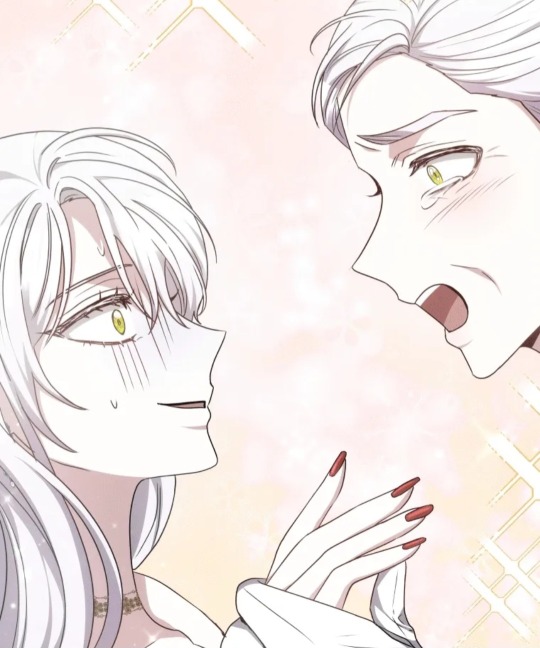
Charlize wakes up in a fantasy world, aware of her incoming death. Anybody who gets in the way of Calix's happy ending is going to get cut in half, and Charlize is the most annoying person in his life. She leaves. She sends him an apology letter too.
Her father calls her back to discuss the missing royal heir sighting.
She saves a child from some bullies and...yes...the child is the long-lost Imperial heir.
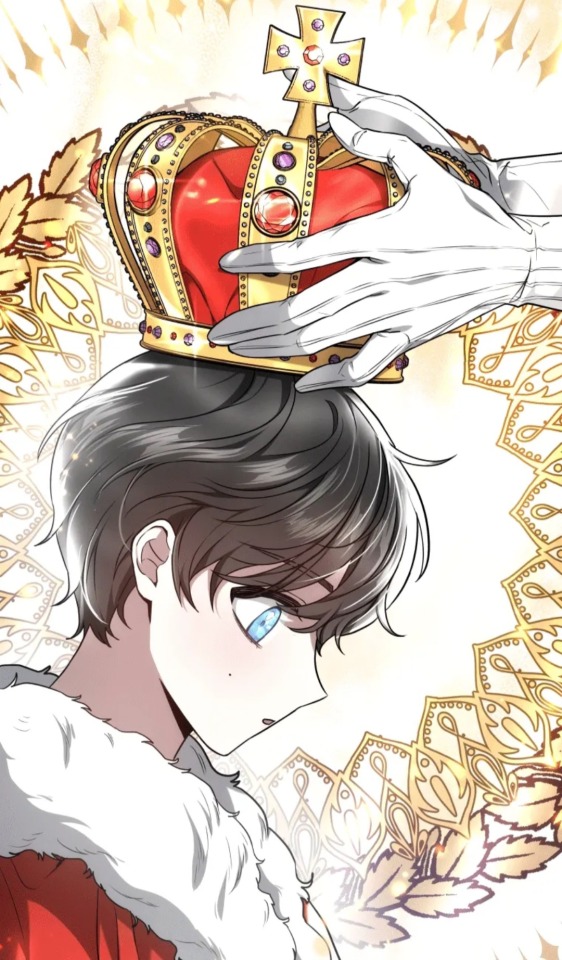
Sasha is sweet, but scared. He is only seven. Charlize doesn't want to die, but she keeps him for a while. She explains it all. She tells the boy he is safe. She lets him cuddle with her, and he learns about his royal birth through her. They play together, and she slowly starts to talk about Calix.
They can't stay inside and play forever.
He must take his crown.
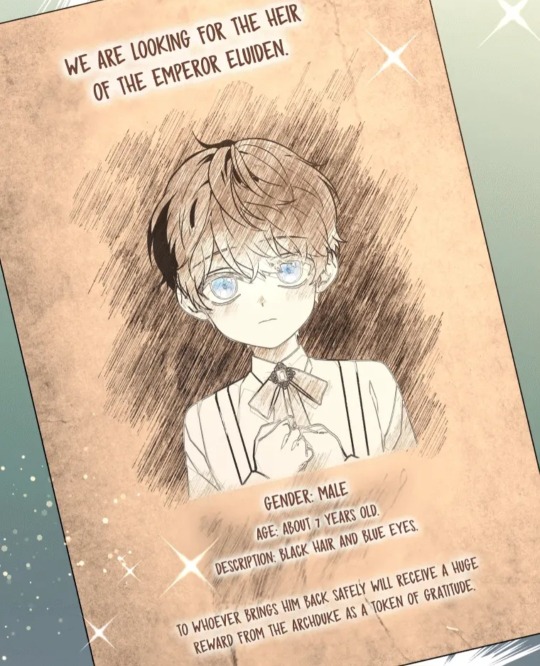
Charlize gives Sasha a letter. She tells him to give it to the guard in front of Calix's gate. She tells the boy to pretend she doesn't exist. He must tell Calix he found the flyer, and he came alone. She says she will see him at balls. They can still chat sometimes, but they must stay apart.
Charlize is known for being spoiled and unbearable, so she cannot approach Calix.
Sasha doesn't understand, but he does his best. He's very grateful to Charlize, so he listens to her.
Then her role in the story....does not end...
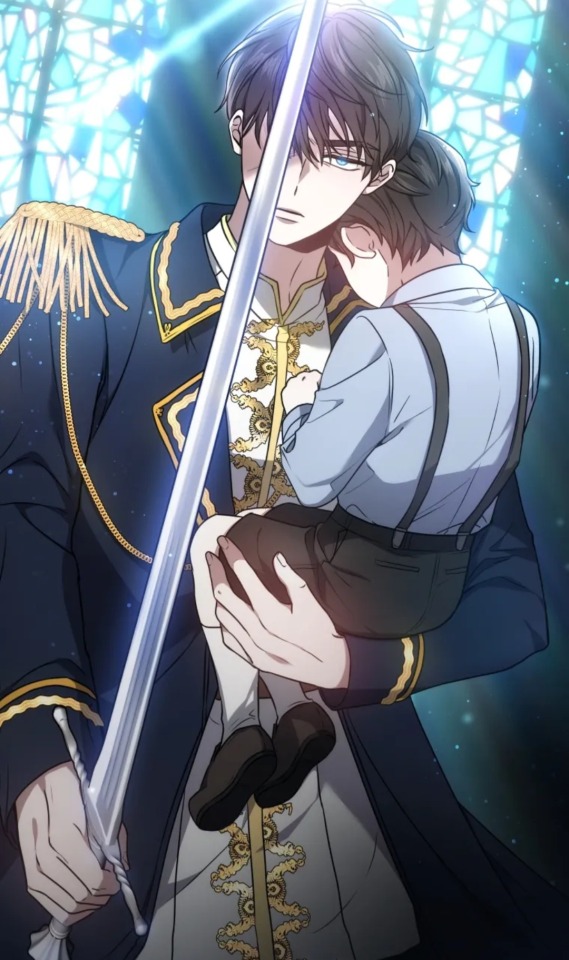
Sasha lands safely in his uncles arms, and Calix will do anything to make Sasha happy. His negligence led to Sasha's life of poverty. He really will do anything. When Sasha starts crying for a woman named Charlize in his sleep Calix does some digging.
He finds his former stalker, Charlize, at the end of the line.
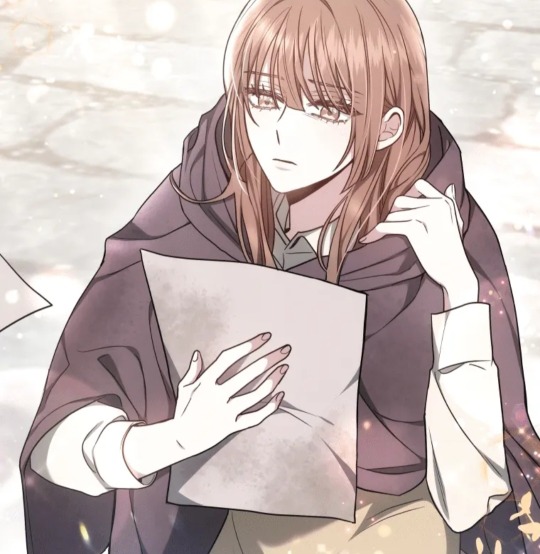
Charlize tries to bring in Ilian, who is currently selling sketches on the street. Ilian is initially suspicious. She's shockingly practical.
In the novel Ilian accepted the Duke's support and love because she needed it. Her love was connected to selfish needs.
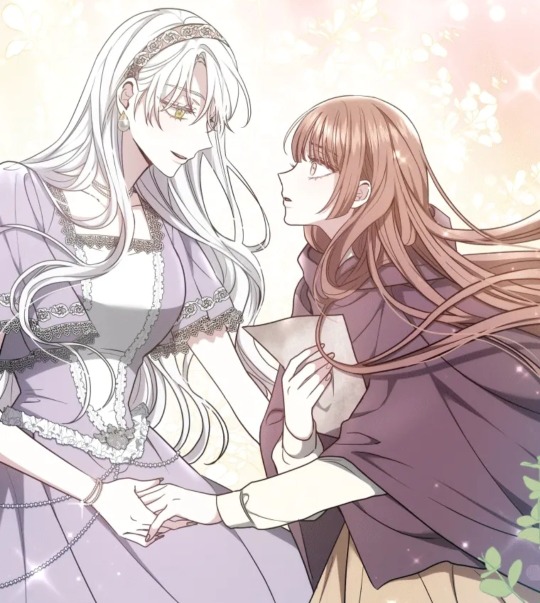
Charlize sponsors Ilian's art career...and that completely ends Ilian's desire for any romance in life. Ilian has always been devoted to art first, before anything else. Being a good wife for Calix was just part of that in the original novel. Now that she has money through Charlize she refuses to go to balls, and she just draws for her mistress.
Charlize is flabbergasted by how strange the dysfunctional romance novel couple is.
The man is obsessed with perfection.
The other considers being a wife a job.
What kind of love story is this????

Calix slowly starts to get rid of his enemies. His enemies are people who hate Charlize, by the way. Charlize is a known demon in social circles, but he starts clearing the way for her before they even get close. It's clear that he's up to his old tricks. A perfect life. A red carpet. A good father and mother for his nephew. It has to be her. The one Sasha likes. Only she can fulfil his need for a complete family.
#yandere#male yandere#yandere male#yandere boy#recommendations#recs#rec#recommended#webtoon#otome isekai#otome games#The Main Male Character’s Nephew Really Likes Me
346 notes
·
View notes
Text
to me, zuko’s relationship with toph is so antagonistic on his behalf because she’s the one member of the gaang (outside of suki who he simply doesn’t consider to be in the gaang tbh) who he least empathizes with, at large and in relation to her trauma. the reason for this is that unlike aang’s, katara’s, and sokka’s traumas which he sympathizes with + connects his trauma to in various ways of arguable aptness, zuko is uncomfortable with the striking closeness of toph’s trauma to his because of how class and privilege factor into their both of their trauma. aang, katara, and sokka are not privileged in any real way, esp not one that reminds him at all of his situation re status and privilege.
zuko finds aang, katara, and sokka's trauma relatable on a level that makes him feel equally victim of the fire nation; that's why he draws lines between kya being murdered in an ongoing genocide to protect katara and ursa, who was certainly not anti imperialism from anything we've seen of her, disappearing to protect him from his abusive father and grandfather. both situations are unpleasant and involve maternal sacrifice, but one is a domestic ordeal while the other is an act of racial violence and genocide. the connection exists, but the context is radically different. still, zuko likes that he can draw those parallels between his trauma and katara's. it allows him more room to feel like a better victim and arguably a bigger one in the context of the war, despite the fact that his status means he did in many ways benefit from his family and country being the perpetrators of it and his own personal role in it throughout books 1, 2, and 3.
i will give the obligatory disclaimer that zuko is a child soldier and he does side with the oppressed in the end, but he himself is not oppressed by the fire nation's genocidal war as a fire nation prince, let alone when he is the fire nation crown prince. he is someone who directly benefited from this war. yes, his father was abusive, yes, he was exiled for 2 and a half years, but he was still afforded many privileges because of the war. that does not negate his domestic suffering or his political exile, but those privileges still came about because of the suffering of others, including the gaang.
this is a nuanced situation. it is extremely complex and hard to accept the simultaneous truths at play here, even for adults, let alone for an extremely traumatized, black and white thinking 16 year old boy. zuko needs to be a victim in the context of the war as well as his family to alleviate his guilt about his participation in it prior to joining the gaang. he needs to relate his trauma to theirs. i will say that he doesn't ever seem to attempt this with suki nor does she offer her trauma to him, but that's more about both the writers and zuko not caring much if at all for her as a person.
but toph receives clear rejection from zuko when she tries to relate to him. her attempts to endear herself to him and to open up to him are shot down. why? surely toph suffered because of the war too. she's from the earth kingdom. but she never suffered a personal loss that zuko respected or related to. toph is not given any dead relatives. she was abused but not in a way zuko would understand, and her abuse did not negate that she lived a relatively comfortable life for being in the earth kingdom during the war. she was rich, she was cared for, she was shielded by privilege in many ways. while zuko is of course far richer than toph, he doesn't want to confront that reality. he doesn't want her privilege to make his obvious. he needs to focus on his suffering, his abusive father, his struggling to fit in as heir, and his time in exile and poverty. he can't accept the idea of those struggles coexisting with his privilege, so he can't accept the idea of toph's either. she has to just be whining about nothing. she has to be a nuisance not to be taken seriously. otherwise, he has to turn and face things about himself he doesn't want to be true.
could he grow to care about her and face his own privilege in the future? sure. but he doesn't in canon.
#atla#zuko#toph beifong#zuko critical#maybe? idk i don't dislike this abt him as a character i think it's really interesting#but it is a shitty thing to do to a 12 year old like omg let her live
75 notes
·
View notes
Text
Raising the Minimum Wage and Its Effects
Ko-fi prompt from [name redacted]:
So, what does raising the minimum wage really do to the rest of the economy?
Hecking Complicated! I think I might need a doc of just. References for this one. But here are a few elements!
(Also, the Congressional Budget Office has an interactive model of how different changes to the minimum wage could affect various parts of the economy, like poverty rates and overall employment. Try it out!)
Reduction of Benefits
A common claim that is used to argue against the minimum wage is that it will result in companies cutting hours for their employees in order to recoup losses by having to provide benefits to fewer employees. This isn't 'the minimum wage is bad' so much as 'corporations are assholes,' but it is unfortunately still a thing that happens. (Harvard Business Review)
This is not a problem with the minimum wage itself, in my opinion, but these issues are emblematic of the weight that self-serving elements of capitalism carry. The low minimum wage is just one part of many that contribute to the current wealth disparity; if things like health insurance were universal, then bosses wouldn't be as able to cut them to employees in order to save money. Current regulations incentivize companies to hire more part-time workers than full-time, in order to avoid paying out benefits. Some cities have enacted Fair Workweek Laws in order to combat these approaches, though the impact is as of yet uncertain (Economic Policy Institute, 2018). Early reports, like the Year Two Worker Impact Report on Seattle’s Secure Scheduling Ordinance, do seem to indicate positive results, though:
In addition, the SSO led to increases in job satisfaction and workers’ overall well-being and financial security. In particular, the Secure Scheduling Ordinance had the following impacts for Seattle workers:
- increased work schedule stability and predictability
- increased job satisfaction and satisfaction with work schedules
- increased overall happiness and sleep quality, and reduced material hardship.
(direct quote from the Year Two Eval)
Unfortunately, these were approved at the earliest in 2015 (San Francisco's Formula Retail Employee Rights Ordinances, which went into effect in March 2016), which means that none of them were in play for longer than five years before COVID-19 ground the planet's economy to a near halt. I tried to find results for the San Francisco laws, but I couldn't find any studies for it; I did find an article from March 2023 that summarized which cities in California have brought in fair workweek laws, though, so maybe someone could use that as a jumping off point (What Retailers Should Know About California Scheduling Ordinances).
Companies prevented from cutting benefits by cutting hours would probably find another way to do the same thing, but let's be real: keeping the minimum wage low won't stop them from cutting every corner possible. EPI has some articles, like "The role of local government in protecting workers’ rights," that talk about how these measures can be, and have been, implemented to protect workers from cost-cutting employers.
Cutting the hours and benefits of part-time employees is a real, genuine concern to have about raising the minimum wage, and those need to be anticipated and combated in concert with raising the minimum wage. However, it is not a reason to keep the minimum wage depressed. It's just a consequence to be aware of and plan for.
Passing Costs On To Customers
A common argument against raising the minimum wage is that companies will raise costs in order to cover the raise in expenses, to a degree that nullifies the wage hike. This is, um. Uh.
Really easily debunked?
Like, really easily.
Over a ten-plus year period, research found that a 10 percent increase in the minimum wage resulted in just a 0.36 percent increase in prices passed on to the consumer at grocery stores. A similar Seattle-based study showed that supermarket food prices were not impacted by their minimum wage increase.
- (Minimum Wage is Not Enough, Drexel U.)
I've talked about it before, but in some cases it's just a matter of how US-based labor is such a comparatively small portion of costs for medium-to-large businesses that raising wages doesn't raise corporate expenditures that much.
That said, some companies rely on drastically underpaying their employees, like Walmart. Walmart's revenue in 2020 was approximately $520 billion (Walmart Annual Report, page 29). Now, this report doesn't actually tell us what amount is spent on labor, but it does give us the "Operating, selling, general and administrative expenses, as a percentage of net sales." This is, to quote BDC, "[including] rent and utilities, marketing and advertising, sales and accounting, management and administrative salaries."
So, wages are just part of the (checks) 20.9% of revenue that is operating SG&A expenses. But maybe I'm being mean to Walmart! After all, the gross profit margin is only 24.1%, so only 3.2% is left for those poor shareholders!
Oh, oh, that means the profit is still over 16billion USD? And Walmart cites having 2.2 million associates in that same report? And that's about $7,500 per employee per year that's being withheld? And that's before we take costs up by like three cents per product?
Which, circling back: A study from Berkeley by the name of "The Pass-Through of Minimum Wages into US Retail Prices: Evidence from Supermarket Scanner Data" found that
a 10% minimum wage hike translates into a 0.36% increase in the prices of grocery products. This magnitude is consistent with a full pass-through of cost increases into consumer prices.
Of course, Walmart does sell more than just groceries, but isn't it interesting that raising a minimum wage resulted in such a small cost increase? If we assume this is linear (it's probably not, but I have so many numbers going on already), then doubling wages from 7.25 to 14.50 would still mean only a 3.6% increase costs! Your $5 gallon of milk would go up to [checks] $5.18.
Hm. Those 18 cents might be meaningful to our poorest citizens, but if those poorest citizens are more likely to be raised out of poverty by raising the minimum wage, then it might just be the case that they too can afford the new price of milk, and have more money left over for things like... rent. Or education. Or healthcare.
Maybe even a cost cutting loss leader like Walmart can reasonably increase its wages. After all, they still have 13 stores on Long Island, where the minimum wage is $15, and has been since 2021.
(I could have just cited the Berkeley study and moved on, but after a certain point I was too deep in parsing the Walmart report to not include it.)
But also... minimum wage increases are often staggered. They start out on the bigger companies, which have the resources to accommodate those changes (unless they've been doing stock buybacks), and then later on the smaller businesses, now that a portion of the economy (those working for the big companies) has the spare change to spend money at those smaller businesses that are raising their prices by a little more than the corporations.
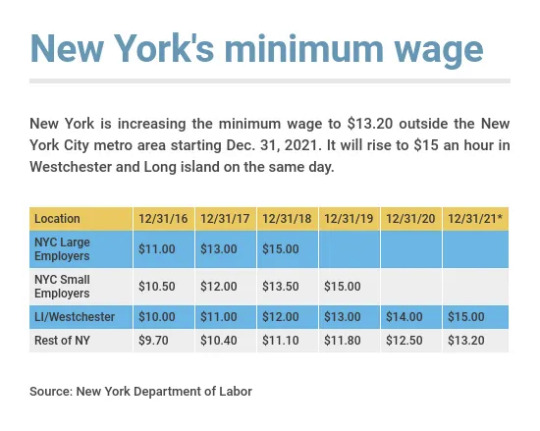
And at that point, all I can really say is, well.
If you can't afford to pay your employees a living wage, you're not an oppressed company. You're just a failing company. Sorry, Walmart&Co, your business model is predicated on fucking over poor people, and so it's a bad business model.
Being a dickhead, while successful, is not actually 'smart' business practice.
(This doesn't even get into the international impacts, like what an "American companies should pay higher wages abroad, especially if they charge higher-than-American pricing for their products, but also at factories where we know they're committing human rights abuses" approach could be but this is already long as fuck so that'll have to wait for another post.)
Anyway.
Inflation
This one is tied into the cost argument above, but like...
Inflation is already a thing? Inflation is happening whether we raise the minimum wage or not. Costs go up whether we raise the minimum wage or not. Who is this argument serving? Not the people who can't afford rent, surely.
Quoting the earlier-mentioned Drexel report (red highlights mine):
While the minimum wage has been adjusted numerous times since its implementation in 1938, it has failed to keep up with inflation and the rising cost of living. The purchasing power of minimum wage reached its peak in 1968 and steadily declined since. If it had kept up with inflation from that point it would have reached at least $10.45 in 2019. Instead, its real value continues to go down, meaning minimum wage employees are essentially being paid less each year.
Additionally, some economists argue if minimum wage increased with U.S. productivity over the years, it would be set currently at $26 per hour today and poverty rates would be close to non-existent with little negative impact on the economy. However, because gradual change was avoided, the extra funds were instead shifted to CEO compensation.
A sudden change in wages now could possibly make a more noticeable impact on the economy, which is often cited as reasoning for a slower increase over time moving forward. Gradual increases with inflation and productivity could have avoided any potential economic ripple effects from wage increases and should be considered in ongoing plans.
Increasing Unemployment
A common argument is that the unemployment rate would jump as employers were forced to let employees go. Assuming they didn't just hire more employees so they could give them less hours in order to cut benefits... not really!
A 2021 article from Berkeley News summarizes the issue, along with several others, covering some thirty years of research that started with "Minimum Wages and Employment: A Case Study of the Fast-Food Industry in New Jersey and Pennsylvania," published in 1993. They also touch on the issue of subminimum wages for tipped workers, though they do not address the subminimum wages set for underage and disabled workers.
“A minimum wage increase doesn’t kill jobs,” said Reich, chair of UC Berkeley’s Center on Wage and Employment Dynamics (CWED) . “It kills job vacancies, not jobs. The higher wage makes it easier to recruit workers and retain them. Turnover rates go down. Other research shows that those workers are likely to be a little more productive, as well.”
- Berkeley News article, "Even in small businesses, minimum wage hikes don’t cause job losses, study finds"
Lower turnover rates also save money for employers, as it causes them to have much lower HR expenses. How much money do you think large employers spend on using sites like Indeed or Glassdoor to find new employees?
This article from Richmond Fed does, admittedly, encourage a slightly grayer analysis:
In a 2021 review of some of the literature, [researchers] reported that 55.4 percent of the papers that they examined found employment effects that were negative and significant. They argued that the literature provides particularly compelling evidence for negative employment effects of an increased minimum wage for teens, young adults, the less educated, and the directly affected workers. On the other hand, in a 2021 Journal of Economic Perspectives article that analyzed the effect of the minimum wage on teens ages 16-19, Alan Manning of the London School of Economics and Political Science wrote that although the wage effect was sizable and robust, the employment effect was neither as easy to find nor consistent across estimations.
Thus, although the literature supports an effect on employment among the most affected workers, it does not appear to be as sizable as theory might suggest.
The International Labor Organization has a similarly mixed result when taking a variety of studies into account. (I left in their own reference links.)
In high-income countries, a comprehensive reviews of about 70 studies, shows that estimates range between large negative employment effects to small positive effects. But the most frequent finding is that employment effects are close to zero and too small to be observable in aggregate employment or unemployment statistics (1). Similar conclusions emerge from meta-studies (quantitative studies of studies) in the United States (2), the United Kingdom (3), and in developed economies in general (4). Other reviews conclude that employment effects are less benign and that minimum wages reduce employment opportunities for less-skilled workers (5).
And there's the 60-page "Impacts of minimum wages: review of the international evidence" from University of Massachusetts Amherst, which looks at data from both the US and UK. I'll admit I didn't read this one beyond the introduction, because this is very long already.
Not all US studies suggest small employment effects, and there are notable counter examples. However, the weight of the evidence suggests the employment effects are modest. Moreover, recent research has helped reconcile some of the divergent findings. Much of this divergence concerns how different methods handle economic shocks that affected states differently in the 1980s and early 1990s, a period with relatively little state-level variation in minimum wages.
I'd encourage you to think of it this way:
Employer A pays $7.25/hr. Employer B also pays $7.25/hr. An employee works 25hrs/week for Employer A, and 20hr/wk for Employer B.
The minimum wage goes up to $15/hr. Employer B cuts the employee. Employer A cuts employees as well, but not this one, and instead increases their hours to 30/wk for greater coverage.
The employee has gone from just under $400/wk to $450/wk. They lost a job, sure, but the end result... They have an extra fifteen hours of free time per week! Or more! With time to level out, you have less jobs, but more employment, because people aren't taking up multiple jobs (that someone else could have) just to survive.
This is a very, very simplified example, which doesn't take into account graduated wage increases (see the NYS labor table) or the benefits issue from before, but it does show the reality that "less jobs" doesn't necessarily mean "less pay" or "fewer employed" people, when so many of those employed at this pay are working multiple jobs.
Even the Washington Post agrees that the wage hike wouldn't cost as many jobs as conventional wisdom claims, and they're owned by Bezos. (Though I recognize the name of the article's author as the same person behind that 60-page Amherst report, so there's that to consider.)
The Kellogg Institute also points out that individual workers were, on average, more productive after receiving the pay increase, so the drop in the bottom line was softened. This is a bit debatable; the results varied based on the level of monitoring, but it's worth noting that most minimum wage jobs are pretty high-intensity, high-monitoring. Goodness knows you don't get a whole lot of time to yourself outside of the critical eye of your shift lead or customers if you're working fast food. They also note a decrease in profits, but I'd point out that they speak specifically of profits, not share of revenue.
To explain the difference: imagine you sell $100 of product in a day. The product cost you $50. Overhead (rent, utilities, taxes) cost you $10. Labor cost you $15. Profit, then, was $25, or $25.
A 16% reduction in the profit does not mean you now retain $11. It means that you retain 16% less of the $25. You now retain $21.
(This is, as with many of my examples, INCREDIBLY simplified, but I need to illustrate what the article's talking about, and I don't have infographics.)
Some other articles on the topic are from The Quarterly Journal of Economics, Business for a Fair Wage, The Federal Reserve Bank of San Francisco (more critical), the Center on Wage and Employment Dynamics, the Center for Economic and Policy Research, UCLA Anderson, Vox, and The Intelligencer, which cites another Berkeley article. I do not claim to have read all of these, especially the really long ones, but the links are there if you want to look into them.
In the interest of showing research from groups that do not serve my own political views, I'm going to link an article from the Cato Institute; I do encourage you to read that one with a grain of salt, given that it's written by a libertarian thinktank, and they are just as dedicated to hunting for research that serves their political views as I am. There were a few other libertarian articles I came across, but the way they presented information kept feeling really duplicitous so I just... am not linking those, or the leftist ones I am also uncomfortable with due to the whole "I'm totally not tricking you" vibes. Also eventually I just got tired, there are so many articles on this and I am just one blogger who is not actually working for a magazine or thinktank, I am working for my own personal tumblr.
Negatively Impacting Slightly-Higher Paid Employees
Did you know that raising the minimum wage affects more than just those making minimum? It affects those just above as well. It's referred to as the ripple effect of minimum wage hikes by this Brookings article. They estimate that a wage hike would affect nearly 30% of the country's workforce.
"Price adjustments provide the principal adjustment mechanism for minimum wage increases: higher labor costs are passed through to consumers, mainly for food consumed away from home. Such an increase does not deter restaurant customers. Price increases are also detectable for grocery stores (Leung 2018; Renkin, Montialoux and Siegenthaler 2019), but not more generally. The effect on inflation is therefore extremely small."
- "Likely Effects of a $15 Federal Minimum Wage by 2024," Testimony prepared for presentation at the hearing of the House Education and Labor Committee, Washington, DC (2019)
This overlaps with general criticisms of widening income equality, citing an AEA article I cannot access since it's behind a paywall. I wonder if it touches on companies like Amazon being headquartered in the city and manipulating the job market by sheer size? I can only speculate.
Plus, there are the health benefits! Which are mostly connected to lessening poverty, and through that lessening stress and increasing healthcare access, but still! Some of these results are debated, but I'd need to know more about the details to know how they're related (University of Washington).
------
I've spent most of the day on this, so if you guys have made it this far and are interested in supporting me, please donate to my ko-fi or commission an article. (Preferably for more than the base price; I'm effectively working at a fraction of minimum wage myself, which is ironic considering the theme of this post.)
(I realistically shouldn't have spent more than two or three hours on this, but I have so many strong opinions on the subject that I couldn't stop.)
(Also: There were so many more sources I didn't even get to read the basic premise of because it was so repetitive after a while.)
#economics#stock market#capitalism#phoenix talks#ko fi#ko fi prompts#minimum wage#minimum wage increase#research
202 notes
·
View notes
Text
The Misinterpretation of Dimitri
Specifically, I'm referencing the frequent misinterpretation of his dialogue with Edelgard towards the end of Azure Moon.
I've seen people claim Dimitri is arguing for the necessity of Church of Seiros/faith and/or divine right of kings. That, because people are weak, they need the people in power to protect them in contrast to Edelgard who wants to empower the people and doesn't think they need to rely on anyone.
This is interpreting Dimitri and Azure Moon through and Edelgard and Crimson Flower lens and not at all what Dimitri's saying here.
Faith and religion play little to no role in Dimitri's life or Azure Moon's plot. Nor does the divine right of kings. Those are motifs and themes explored in Edelgard's story, not Dimitri's. The argument above is only true if you view the whole game through a crimson-colored lens.
So what is Dimitri actually saying? That the bootstraps mentality doesn't work for everyone. Some people need help - many kinds of help.
More relevant to Dimitri and AM's story is the importance of emotional support and having people to rely on. To a lesser extent, it's also Dimitri's reaction to living in poverty while on the run. He understands that some people need emotional support and time to properly grieve to move on from trauma. He also understands that some people don't have access to proper food, shelter, etc . . . and will need government assistance to move forward. He's arguing that Edelgard's ways leaves behind the people who need something or someone to lean on, hence "the path of the strong."
He isn't even saying everyone is like this. Right in that dialogue he acknowledges Edelgard as an exception. Edelgard doesn't need time to grieve. She processes trauma by pushing forward. While I am personally uncomfortable labeling that as "strong" compared to grieving as "weak," that's an argument for another time. As an imperial princess and then Emperor, she has no lack for resources either, unlike Dimitri during his time on the run and the others living in poverty he came in contact with.
So, no. Dimitri's not arguing that faith is a necessity, but that it is needed by some. He's pointing out that Edelgard's ways strip people from safety nets - regardless of the form it comes in. He's also arguing that people at the bottom need people at the top to provide for them to lessen the inequality gap - not necessarily in the form of a king - but that Edelgard's war leave them destitute and her meritocracy unable to compete as long as they're "weak" in any way.
Does this mean Edelgard's wrong and Dimitri's right? No. There's flaws with Dimitri's rulership too, but what he's pointing out here is a major flaw in Edelgard's beliefs and ideas about government and it should be explored as such rather than seen in a borderline bad faith interpretation.
#fire emblem#fire emblem three houses#dimitri alexandre blaiddyd#three houses#dimitri fire emblem#fe3h#azure moon
399 notes
·
View notes
Text
ACOTAR if the books were written from Tamlin's perspective
Exploring the nuance that the fandom often overlooks.
The ACOTAR series is told in first-person perspective. Although this allows us insight into the inner workings of certain character's minds, it also means that these accounts can be biased, or lacking nuance. To this day, Tamlin's perspective has not been shared, and I want to attempt to do that.
Please note that although the books were predominately told from Feyre's viewpoint, it doesn't mean that her thoughts and feelings are invalid. I am also not condoning Tamlin's actions (explaining ≠ excusing). These are fictional books; breaking them down and considering different angles is of great merit - even if you don't personally agree.
The story of Tamlin; how it all started.
Tamlin grew up in an extremely violent and abusive household - the extent of which largely remains unknown to the readers. We do know that his parents did not love each other, and that his father and two older brothers were canonically worse than Lucien's (and we know how bad they are).
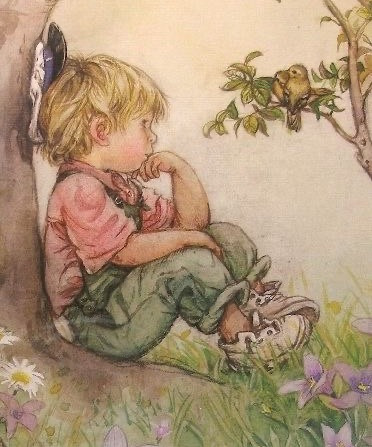
Tamlin's father was even friends with the King of Hybern and Amarantha; two of the most insidious individuals in Prythian. In fact, Tamlin's father would regularly drag him along to visit them. It was during these visits that Amarantha grew to desire Tamlin, presumably when he was still rather young.
Amarantha then continued to sexually harass Tamlin for centuries. As readers, we do not know exactly what Amarantha did to Tamlin during that time; he is yet to open up about it.

An unlikely ruler.
Tamlin never wanted to rule the Spring Court. He stated that if he did, his brothers would have killed him "before he could reach adolescence." As a result, his only choice was to join the brutality of the army.
Instead, what Tamlin actually wanted was to become a travelling musician, spending his days playing the fiddle.
However, when Tamlin's entire family was (justifiably) murdered by Rhys and his father, he was forced into the role of High Lord of the Spring Court. Unlike Rhys, Tamlin had no friends or Inner Circle to help him, or to offer him support.
Although Tamlin rightfully shares the blame in what happened to Rhys's family, we still never received his version of events. Many have theorised that Tamlin was tortured by his brothers and father for the information about Rhys's family (as at this point, Tamlin and Rhys were best friends); I believe this to be likely.
Whatever the circumstances, one thing was now clear - Tamlin was entirely alone.
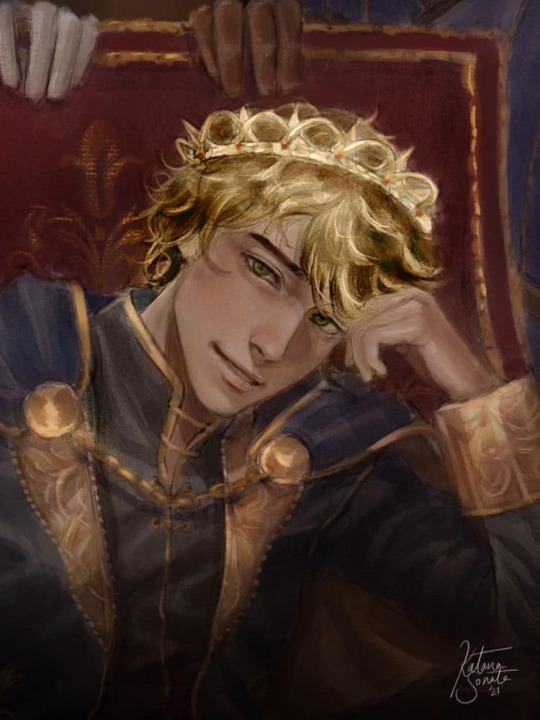
A reign ravaged by Amarantha.
Despite the circumstances, Tamlin does his best to rule the Spring Court. Although he is still largely inexperienced, he is vigilant about not following in the footsteps of his abusive father and brothers.
However, his efforts are halted when Amarantha, the woman who has relentlessly sexually and romantically pursued him for years, curses his entire court, and turns his heart to stone. Tamlin is forced to watch all of his companions and court advisors either die, or suffer tremendously, as a result of the curse.
Despite this, Tamlin does what he can for his people - even those outside of his court; offering shelter and employment to countless refugees.
In fact, when one of Tamlin's civilians was killed by Amarantha, he carried the faerie in his arms and into the gardens. He then buried the faerie with his own hands; "a High Lord, digging a grave for a stranger."
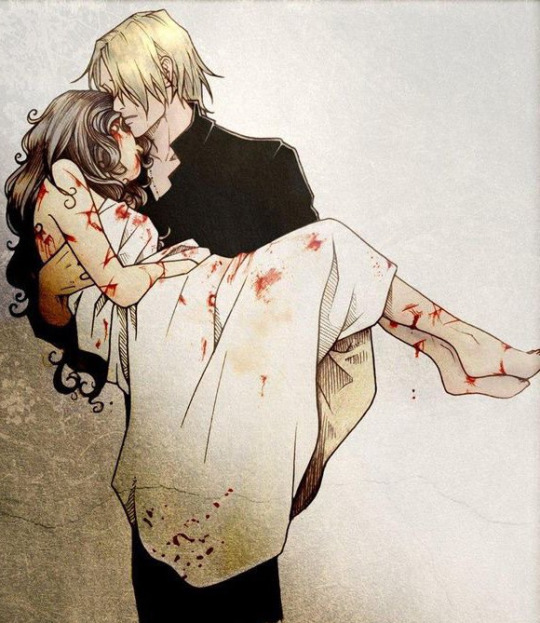
Meeting Feyre; the beginning of the end.
By chance or fate, Tamlin met Feyre Archeron. She was the first person he had ever loved in 500 years - the only one to make him feel "less alone."
Tamlin brought Feyre's family out of poverty and healed her father's leg. He rebuilt the art gallery for her. He was the first person to recognise the sacrifices she had made for her family. Most of all, Tamlin fell in love with Feyre in her human form - exactly as she was, with no mating bond to biologically pull her to him.
Prior to the events of Under the Mountain, Tamlin tells Feyre that he is "not her jailor." He tells her that she doesn't need a "keeper," as he kneels before her, and dedicates a song on his fiddle to her.
So, what changed?

Under the Mountain.
Amarantha happened.
Tamlin was forced to witness the woman he loved be brutalised and tortured. Knowing Amarantha was in love with him, Tamlin is powerless to help Feyre; to make his feelings known, means instant death for her. It is why Tamlin gets on his knees and begs Rhys to keep Feyre's identity a secret.
However, Feyre is ultimately killed. She was only brought into this situation because of Tamlin; he is riddled with guilt and despair.
Yet, by some miracle, Feyre is resurrected. Tamlin now has the chance to protect Feyre, to save her, in all the ways he was unable to before.
However, he goes overboard. He becomes possessive and controlling. Despite promising Feyre that he was not her "jailor," he locks her in the manor. He shuts Feyre out. The trauma only festers - for both of them.
Tamlin's behaviour was abusive. Feyre had every right to leave, and she was far better off for it.
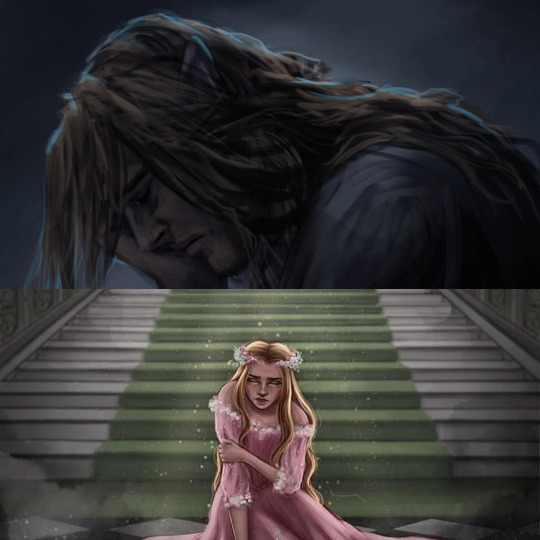
Readers react (but, is it fair?)
It is for the above reason that Tamlin is one of the most hated ACOTAR characters. That hatred is justified.
But, where is that same hatred for all other SJM characters who behaved just as badly as Tamlin? Or, those who behaved even worse?
Rhys is still the character who:
Drugged Feyre and made her dance provocatively Under the Mountain (until she threw up). Rhys later admits he did this in part to make Tamlin jealous.
Twisted Feyre's broken arm to enforce consent.
Kept a 24/7 shield around her (the same sort of action Tamlin is criticised for...).
Refused to tell Feyre that her pregnancy would likely be fatal (despite their 'no secrets' promise); stripping her of the autonomy to make decisions over her own body.
Then, threatened to kill Nesta when she revealed this information.
And I hear you - "Rhys was just trying to protect Feyre!" Yet, wasn't that Tamlin's motive too?
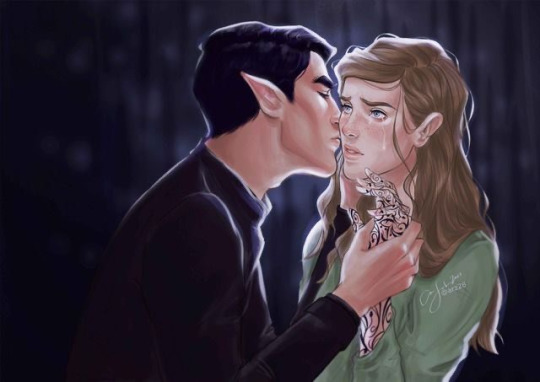
This double standard exists for most other SJM characters:
[TOG Spoilers] Rowan, one of the most powerful fae warriors to ever exist, punches Aelin, a 19 year old who is newly discovering her fae abilities, so hard in the face that she hits a wall and bleeds. He then tells her that she should have "died long ago". Tamlin never directly laid his hands on Feyre. Yet, Rowan does, and his behaviour is always excused (and even romanticised). What's more, is that his relationship with Aelin is one of the most highly regarded.
[TOG Spoilers] We then have Manon who committed literal mass genocide for centuries (and delighted in it), even killing her own sister in the process.
There's Azriel who has a twisted affinity for torturing people.
Nesta who was verbally and emotionally abusive towards Feyre throughout their childhood.
Don't get me wrong, I love all of these characters. They are nuanced, morally grey individuals; this complexity is what makes SJM books so great.
Yet, why does this same nuance rarely exist for Tamlin?

Considering the events from Tamlin's perspective.
Readers criticise Tamlin for collaborating with Hybern to 'get Feyre back.' However, from Tamlin's perspective, Rhys was the person who willingly served Amarantha for the past 50 years. Tamlin also believed Rhys's facade that he was the insidious dictator of the infamously cruel Night Court. What's more, Tamlin is also aware of Rhys's mind control powers. So, when he receives a vague letter from Feyre (who as far as he knows, couldn't read and write), of course he is suspicious.
Tamlin truly believes that Rhys has kidnapped Feyre, and that she is in danger. In order to rescue her, Tamlin pretends to work with Hybern. He jeopardises the safety of his civilians, puts his entire court at risk - all to save the woman he loves.
If Rhys sacrificed the Night Court to save Feyre, we would deem it an act of true love. So, why do we condemn Tamlin?
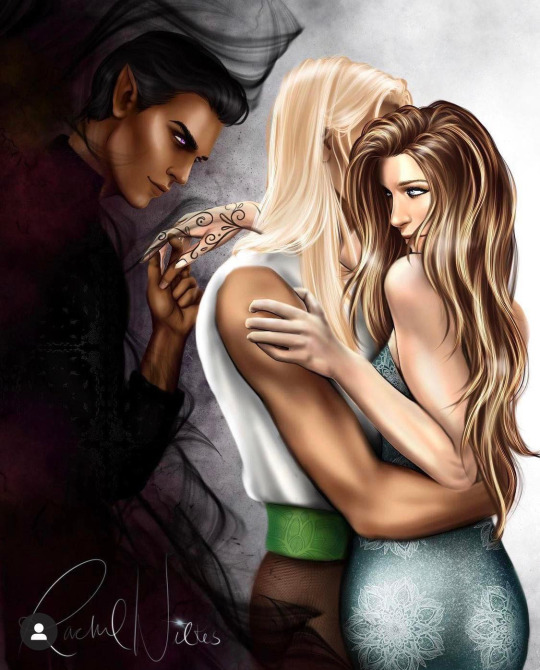
What's more, both readers and characters blame Tamlin for the King of Hybern's actions; that Elain and Nesta went into the Cauldron because of him.
However, as soon as Tamlin realised Hybern's true plans, he blew his cover in an attempt to stop the King. He was the ONLY character who lunged for Hybern in an attempt to save Elain (whilst everyone else stood there in shock).
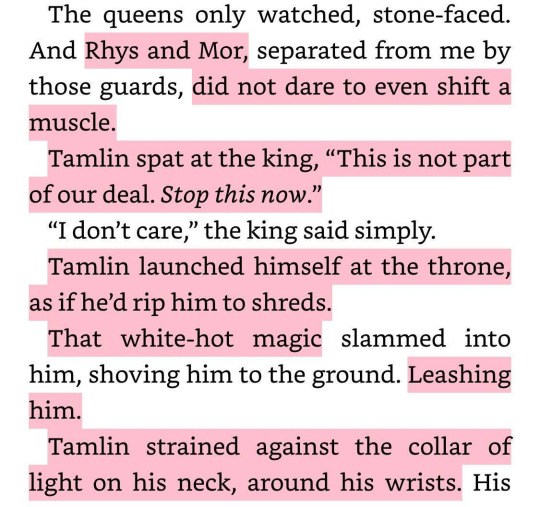
Shortly after, Tamlin realises that Feyre left him willingly. That she is with Rhys, and they are mates. Then, Lucien, Tamlin's only friend, leaves for the Night Court too.
To top it all off, in an act of revenge, Feyre orchestrates for the downfall of the Spring Court - an action that risks the lives of countless innocent civilians. As a result, Tamlin now has no one. No court.
Tamlin has nothing left.
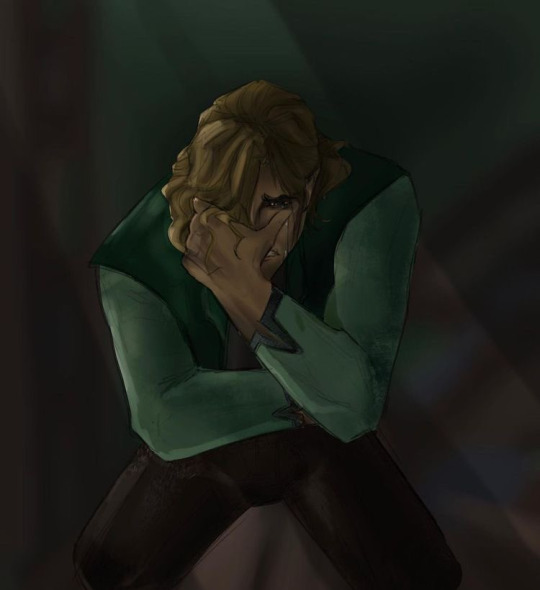
Tamlin's choice.
If we are all being honest with ourselves, most people in Tamlin's position would feel immense resentment. Many would resort to revenge, just as Feyre did. However, Tamlin never takes this path - he never gives in to the hatred and bitterness that could so easily consume him. He chooses otherwise.
Not only did he turn the tide in the war, saving Feyre and Elain's life;
Not only did he resurrect Rhys - the man who took so much from him;
But above all else, he wished for Feyre to "be happy."
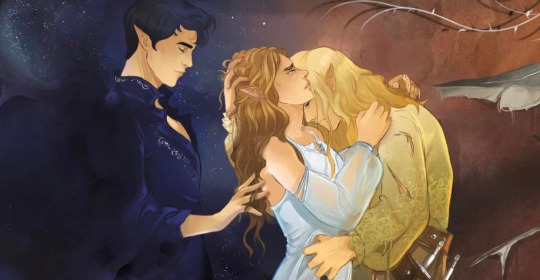
Yet, despite all of this, although most other characters got their happily ever after, Tamlin now roams around the decimated Spring Court. He stays in his beast form, as if he doesn't even feel worthy of being fae - of his humanity. Tamlin is depressed, and very alone. He has always been alone.
To me, his character can be summarised by this quote;
"I sat with my anger long enough, until he told me his real name was grief."
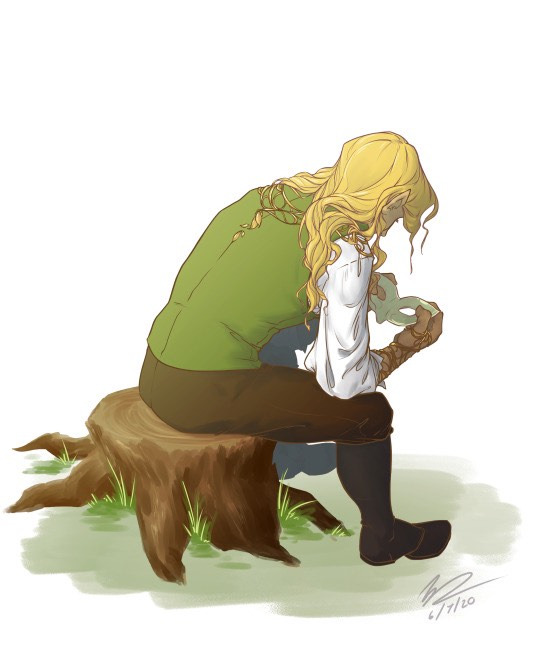
Tamlin's redemption.
Some believe that Tamlin deserves no redemption. That instead, he is better off dead. However, I think that sends a rather grim message to the myriad of people who suffer in the same way that Tamlin does.
To those who externalise their pain, rather than internalise it. To those who were never shown love as a child, and therefore struggle to display it as an adult. To those who were hurt by the people they trusted most, so they hurt others in return. To those who still hold onto guilt over their past. To those who try to be a better person, but still feel like a failure deep down.
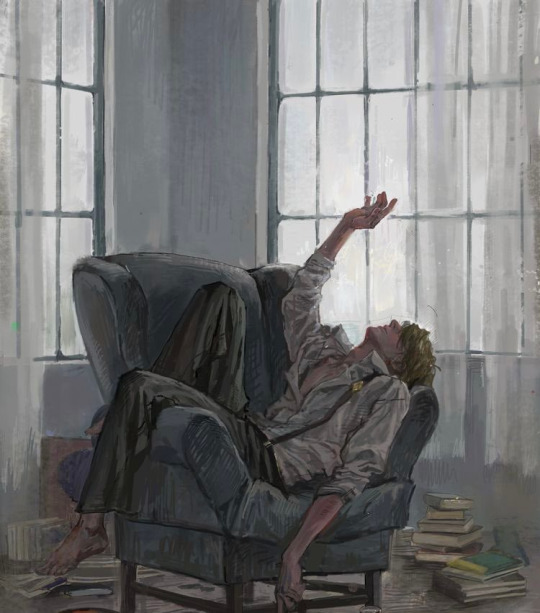
That doesn't mean that Tamlin's past actions should be excused, or even forgiven, But, just like every other character, it does mean he should have the chance to heal.
In her most recent interview, SJM says it herself; that no character is doomed to be an "asshole" forever, and that any day you could choose to wake up and be a better person - to live a better life.
A fairytale ending.
Ultimately, ACOTAR was inspired by Beauty and the Beast, and Tamlin is the perfect personification of the Beast. Not just for his shapeshifting form, as we came to believe in the first book. But rather, just as the Beast in the fairytale was a man haunted by his past mistakes, so too is Tamlin.
Yet, as the tale goes, the Beast's once hardened exterior begins to melt away, and he is able to look towards the world with kindness. To love again. To love himself. When this happened, the enchanted rose came back to life.
I believe this foreshadows what will occur with Tamlin in future books. As he begins to heal, to find his place in the world, he will blossom.
And, so too will the Spring Court gardens around him - vibrant again, once more.
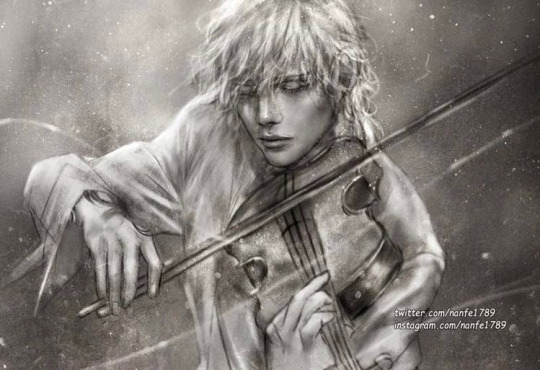
587 notes
·
View notes
Text
Yawns, g'morning.
I'm thinking about Vaxleth and episode 51, as. Most of us are, really. Holy shit.
And I think Vax's divine nature played a role in how Ludinus was able to set and bait this trap. I don't think we'd have gotten this outcome if Vax was still a mortal Champion, like his sister. Furthermore, Keyleth’s position as Voice of the Tempest was also critical here.
Let me explain: let's say some other half of a ship could have fulfilled this orb critera. If we pretend that any Champion could do (I think they needed the divine aspect of Vax's unlife but play along here), why not bait the trap for Vex, or Pike, or Scanlan, or Yasha?
Beyond the 'Vax is practically an angel now and has orb properties' angle, I think part of it is the sheer... everything that is mortal. If Percy was captured Vex would have any number of solutions - send Trinket in, attack at range, Rogue it up, or do the sensible thing and bring in friends. The living are variable, you can't count on them to behave as you need.
Ludinus loathes gods and their servants: of course he'd expect them to be predictable - and he'd be right! Vax is not all Vax anymore (see Dalen's Closet and Tal’Dorei Reborn), he's a deathless shepherd and servant of the Raven Queen. Why would he think this through? He has no life to lose, only Keyleth’s to save. You don’t need to consider how to use a shield, you just do. People shape their plans around the steady expectations of gods, their almost immutable domains, and Vax is divine enough for that to apply to him. They'd know he would behave exactly as he did. It could be argued living!Vax would as well, and there are several songs and historical records about him, so worst came to worst Ludinus could hope that this is maintained. But that's an uncertainty, and not fitting for a centuries-long plan.
And now the second part: it had to be Keyleth. They couldn't have used Vex to draw him out, I don’t think, as much as it pains me. Either the story of Dalen's Closet was limited to the guests and any lil kids who heard the Ballad of Derrig or it proves the Champion cannot willingly approach his sister. It took a Wish for that.
Vex has had five kids, spent thirty years protecting Whitestone, and has her fingers in the financial goings on of all Tal’Dorei. By no means does she have a small impact on the world: her smallest taxation decisions could mean poverty or wealth for thousands! But many of her biggest impacts on the future, on destiny, have already come to pass. Her adventures in Vox Machina, the children she bore, the decades of decisions she's already made (I doubt she'd be on the council for even a few years without changing much of her sphere to her liking.)
Keyleth is the Voice of the Tempest. She will, hopefully, live almost two thousand years. Imagine all the lives she will impact in that time! Directly! The Matron must be so familiar with her strand of fate because it touches so many, many others!
Even if Vax, somehow, did not remember her. Even if he was a shell of himself. This is someone the Matron cannot let die before her time (hopefully a thousand plus years from now). This is one person she would have to bend the rules for and see saved, and there's just the man for the job. She would not allow intervention for Vex, or Percy, or those nieces and nephews Vax surely watches. Not Velora, not Scanlan, not Gilmore. Keyleth, with centuries of work to do in this world, with generations to guide, is too valuable.
What I'm saying is... literally no other ship could have pulled this off. None. This was built for Vaxleth, from its very bones. You could have, say, an AU where Vex is the Champion of Ravens (wink), and this would not be certain enough for Ludinus to bank on it. Very likely, but not assured (the Matron could refuse to intervene, or they could intervene in a less 'take me instead you lil red-storm shit' way, etc.).
Evil plans bank on the inevitable. Gravity, greed, time. Their love is inevitable, a law of nature.
It could not have been anyone else
#Vaxleth is! not one of my main ships.#EXCEPT for those dozen-ish episodes where Vax is a Revenant and the angst is top tier and OH BOY DOES THIS DELICER#deliver*#cr spoilers#critical role spoilers#critical role#critrole spoilers#vaxleth#vax'ildan#keyleth#keyleth of the air ashari#cr c3e51#c3e51#campaign 3#vox machina#ludinus da'leth#cr meta
375 notes
·
View notes
Text
Characters with wasted potential: kurooboro
It's our favourite intelligent nomu kurooboro that deserves so much more attention and a better arc then what he got.
Personally the narrative does seem to treat oboro and kurogiri as two different characters which I like but I wish we got more exploration on that.
Kurogiri
Kurogiri is shigarakis caretaker he is also AFOs servant. However, that's all we know.
1) I would have it that kurogiri used to be a loyal AFO servant. He became a servant/puppet due to him falling through the cracks of the system and trying to escape poverty in anyway he could. Overtime kurogiri got physically sick and his body started to fail yet he still worked for AFO accepting what he did. Afo recognises kurogiri as a valuable asset when his plan of capturing eraser and his quirk goes to mess and starts plotting with the doctor to help kurogiri get a new body which happens to be oboros.
The doctor manages to successfully do this transfer or so he thinks. The doctor is weird and creepy and yes he manages to do implant kurogiri's mind and quirk into a vestige but this comes with some drawbacks like oboro and kurogiri both sharing a mind and body or oboro physically and spiritually rejecting kurogiri making it so that his body is tearing him from the inside out in some way.
Kurogiri is tasked with the job of taking care of Shigaraki and at first he is quite indifferent to the child and doesn't care for him. However, as time goes on he does slowly warm up to shigaraki and care for him ( I love dad kurogiri too much for this). This puts kurogiri in a rough position, he cares for shigaraki but he also hears the plans that AFO and the doctor have in mind for him and he indirectly tries to slow them down or hinder them. All of this is little to no prevail, as much as kurogiri cares he isn't equipped or certified to take care of a traumatised child or to stop afo and the doctors plan.
2)Kurogiri makes a little plan. The plan is one where he gets a bar (AFO allows him) and he basically runs the bar. From the money he gains in the bar he spends some on shigaraki but also hides some of the income to at least assure his and shigarakis own survival. Sadly, the plan is found by AFO himself and the doctor does some "modifications" to kurogiri (practically torture) to keep kurogiri complacent and become the perfect puppet, to play his role. Kurogiri glad that AFO didn't take the bar away from him , but now takes like 50% of the income he earns spends the money on various things. He still has a plan but the initial plan for him to escape with shigaraki is looking slimmer and slimmer. He has a moment where he starts to desire freedom to escape and burn everything he has to the ground to fully forget about shigaraki, AFO, the doctor and all. Yet he stays and finds way to passively retaliate and rebell against both AFO and the doctor.
During this time he and oboro/ oboro's spirit and remains bond over their experiences. Considering that they both want freedom one way or another they work together to enhance their quirk.
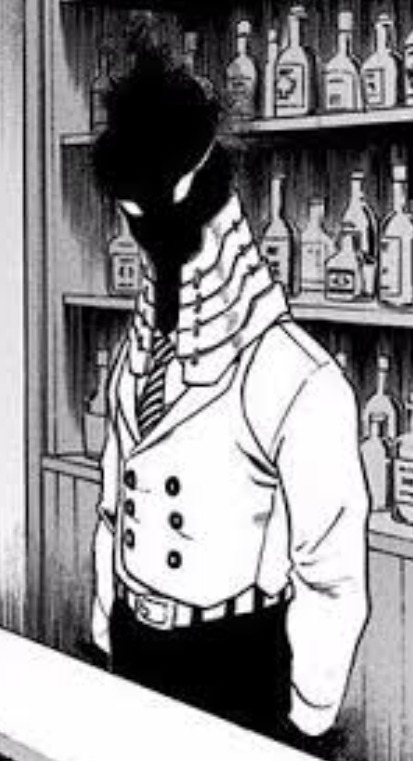
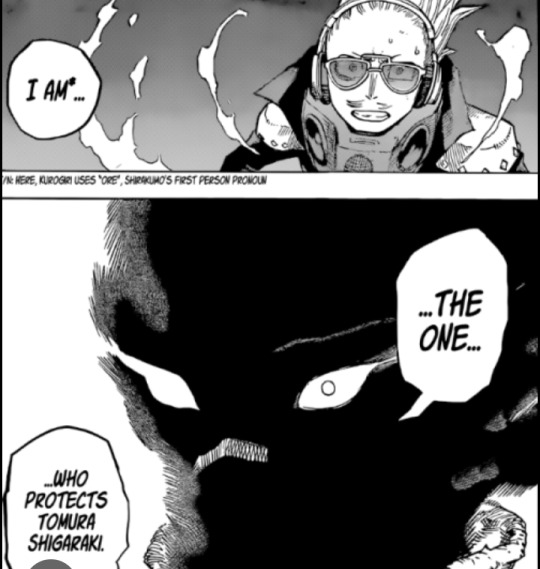
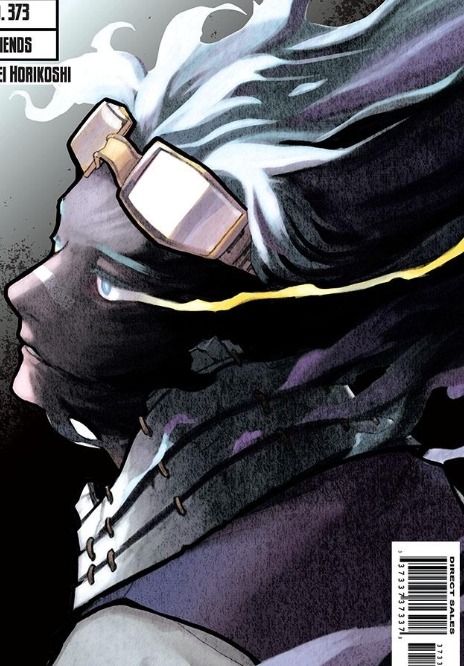
Oboro shirakumo
Oboro shirakumo is a former 17 year old hero student who is friends with midnight, present mic and Eraserhead. He was majorly injured during a work study that he did with his friends trying to help save some children.
1) Oboro doesn't actually die, he is just declared dead and taken away. Afo is pretty disappointed when the villain fail to kill/ bring to him Eraserhead and accidentally bring in a heavily injured oboro. The doctor takes oboro, thinking that his quirk has some potential and suggests the idea of making oboro and kurogiri a merger intelligent nomu. AFO agrees to this of course and oboro's body is basically healed/ fixed by the doctor to become a suitable vessel.
2) at this point oboro is in a coma. However, when the doctor tries to merge the two oboro does show signs of retaliation and rejecting kurogiri, yet kurogiri overpowers him. Oboro is scared and untrusting of anyone around him at the moment. Both he and kurogiri get into a lot of arguments over the body they share which proves for it to be difficult to live in the body.
3) due to their differences and background oboro and kurogiri do not get along at first. Oboro is still quite naive about the world but his counterpart kurogiri isn't . Due to their close forced proximity and the fact that both want the body they are in to function they try and cooperate. They get to know eachother and start to understand their respective sides. Kurogiri shares his story, how he had to live on the street and survived of barely anything, how he enjoyed being a bartender before his body started failing him and he had to quit and fully dedicate his life to being AFO's servant. That's when oboro shares his own experiences how he wanted to be a hero, own an agency with his friends and how he also wanted to help others. They continue to cooperate and both make the plan of saving up money and running away from AFO.
3) When that plan is found out and the doctor does his 'modification' oboro goes silent, taking the blunt force of it at the time. This happens for a long while and kurogiri feels alone, this is when he starts to think of just leaving and destroying everything. Oboro is silent, he is stuck in a limbo place. Kurogiri thinks he can see oboro's spirit when he is sleeping but that is neither here or there. However, when they meet Eraserhead in the USJ oboro makes a slow awakening. He physically makes kurogiri's body hesitate and that's what causes them to be stuck in Todorokis ice.
4) Kurogiri is shocked of course and after the battle both of them have a conversation. Oboro isn't aware of how it works and doesn't remember anything after the doctors modifications which is when Kurogiri fills him in about what happened. Both start to work harder than ever for a chance at escaping whether it be them escalating their passive rebellious behaviour to AFO or trying to guide shigaraki to a different path.
They try their best, they really do but looks helpless and their chance at freedom is long and far. That is when they choose to slowly collect information in journals and allow themselves to get captured some time after the overhaul arc revealing their identity.
All of oboro's friends (NOT JUST ERASERHEAD LIKE IN CANON) are conflicted, confused and upset. They comfort eachother and all come into different conclusions, scared but so hopeful for a restoration of normalcy in their lives. It is present mic and eraserhead that try to make the first move, trusting the information that kurogiri provides them and slowly help kurogiri. Present mic is the first to come around at first not believing that its oboro but wanting the information, wanting to know if there is a traitor. Secondly, it's eraserhead out of pure hope and denial, he knows it isn't logical but he misses oboro and hasn't moved on. He now needs to understand that oboro isn't oboro but he is much more complex and has went through things. Lastly, it's midnight with a combination of both factors and guilt. She tries to avoid kurogiri as she blames herself for what happend and also starts to rethink her actions as a hero.
Working with the heroes gets kurogiri out of prison and under UA's custody really but he still is quite ominous especially kurogiri who still wants to save/help shigaraki and ends up talking to izuku about it.
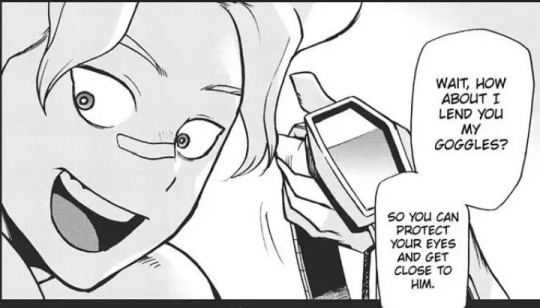
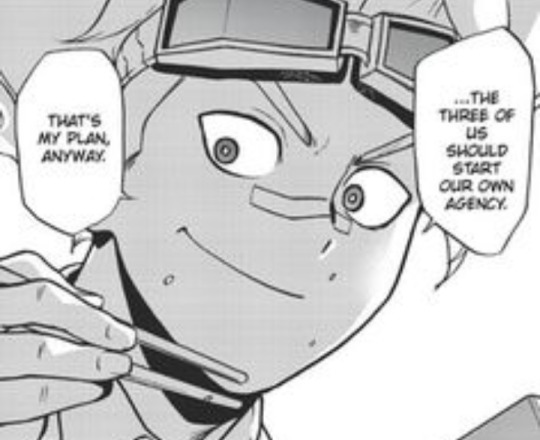

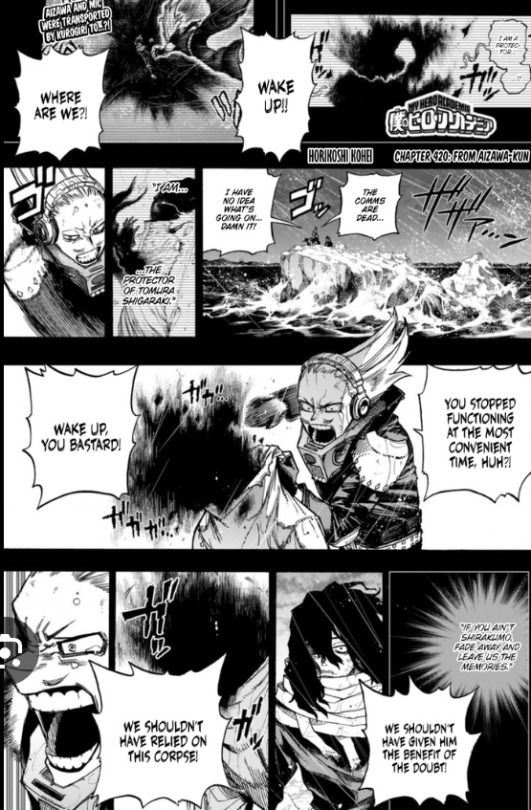
I feel like there are way too many ways we can take kurogiri and oboro's characters in, all with different ways and endings but canon managed to do such a horrendous disservice to him so I hope I have given him some justice
#mha critical#bnha critical#mha#hori is a bad writer#horikoshi critical#bhna critical#bnha#kurogiri deserves better#kurogiri#oboro shirakumo
47 notes
·
View notes
Note
hii could i request hc s for yosano, kunikida and chuuya with a s/o who has a small child (like 4yo) just lots of fluff kinda found family vibes (completely ok if you don’t wanna write it tho, you can just ignore it i’d totally get it)
a/n: sorry this took such a loooong time but no i did not ignore this this is sO CUTE HAHA i don't usually write for Yosano but i gave it a shot anw tho it might be ooc :')
with an s/o who has a young child
featuring: Yosano, Kunikida, Chuuya x GN!Reader
Yosano Akiko
She's the quickest to come to a decision when it came to entering both your lives. Perhaps it's her age or simply her disposition, but taking care of the two of you isn't a hurdle for her at all.
She loves teasing and spoiling you but especially your child. This is why they love her so much that an outsider might think that she was the biological mother. They're that close.
Going out to buy stuff is their your favorite activity together. Whether it's just groceries or more clothes, home decor, and toys, the three of you will go at the same time.
One of her qualities that was extremely useful when dealing with your child was her patience. It's probably not just due to her background as a doctor, but her life experience is just a huge factor altogether.
When it comes to protectiveness with the small stuff, she's not as intense as the other two on this list. Of course the child's safety is of utmost priority but injuries and the like are normal and, in her opinion, necessary to build their character. (And also there's her ability when it comes to it, so the confidence goes up tenfold)
She's not afraid to be more openly affectionate with either of you. She knows you two need it and nothing makes her happier than seeing you two happy and loved.
Kunikida Doppo
He was pretty hesitant to start a relationship with you at first. It's not that he doesn't like that you have a child, it's more of he's not sure if he's ready to play the role of a father as well. But he knew there was no going back once he's formed an attachment to your child.
It was easier to win over the child than it was you for some reason. As much as he likes children, he wouldn't say he's an absolute natural at handling them. It was a big relief and advantage for him, then, to have them on his side.
Theirs is a pretty standard father-child relationship - not that it's a bad thing. Kunikida is 100% dad material even if he's not quite at that age yet. He's quite protective, lectures (nicely and softly) often, etc.
His teacher side will come out as well. Explaining the world to them is essential for their development (or so he says). Plus children are naturally inquisitive so he answers their questions adequately most of the time. Goes in depth with them, too.
He's the least likely to go on frequent one-on-one dates with you. Don't get me wrong, he loves you very much, but compared to the other two he's more than content to spend with you two as a family. It's also because he's so concerned that something might happen to your child that he'd want to be by their side as much as possible. (Ofc just tell him if you want to go on dates more often he'll definitely listen)
Overall, he does his best to be a good partner and father. He may be strict with you at times, but that's only because he loves you two so much.
Nakahara Chuuya
Similar to Kunikida, he was worried that you being in a relationship with him might not be the best for you and your child. But his mind changed when he was once welcomed into your loving home: what emerged was the overwhelming desire to protect it.
Hence the spoiling. Lots of spoiling. Whether it comes to buying you two things or giving in easily to your demands, it's just so hard for him to say no. He doesn't want either of you to go through the poverty he went through.
He's such a sweet guy that I can't even begin to describe it. Every present and favor he does for you is done thoughtfully, and he definitely puts so much effort in becoming the lover you've always dreamed of.
Even if he doesn't visit often due to work, it only makes every moment more special. Your child looks forward to being with him (even if only to sleep together). They love sleeping on top of him to prevent him from leaving too soon and most of the time, it works.
You love seeing them play together. Chuuya's good at it, but most of all his inner kid comes out and it's such an adorable sight you can't help but let them indulge in it. The best part is watching him try to mind his language around them. The one time he let it slip and your kid copied him, he was mortified (while you were thoroughly entertained).
The mafia life is far away from your home. He rarely ever talks about it let alone think about it whenever he's with one or the both of you. During these times he's just himself - not a mafia executive, not the boss's underling - he's just Chuuya.
taglist: @irethepotato, @kisara-16reblogs, @thatdazaikin, @dazaee, @menshusband, @celestair, @bloobewy
229 notes
·
View notes
Text
Let me think a bit about this scene between Jump and Porche to distract myself from the fever 😩
So! I guess a lot of us have wondered why Jump was so interested in Porche's dad during the car scene. After all, what does it matter to him who Porche's father is? But of course, Jump has already shown that he can be quite attentive. He is someone who likes to acquire information about the people around him, because you never know when it'll come in handy!
So now we have Jump who notices a piece of paper in the car's trunk. It tells him that the car is registered under the name Jason Lee.
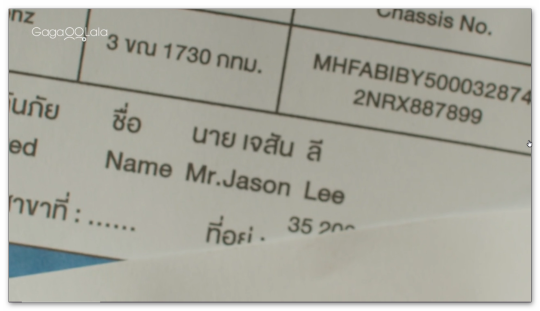
He then learns from Porche that Jason Lee is Prom's and Porche's dad. But wait... Lee? Jump gets very interested all of a sudden, because neither Porche nor Prom use that family name. Their name is Ponglred!
Jump immediately moves away from Porche and continues to ask "Are you mixed?" (aka dad is Chinese while the mom is Thai) and most importantly:
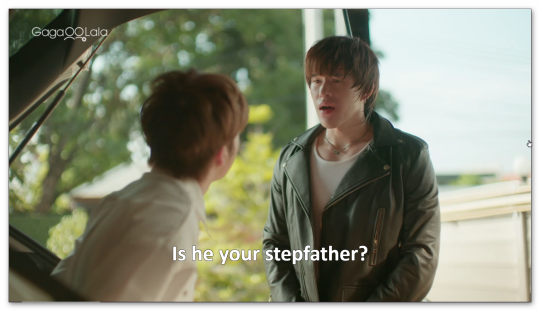
Now I don't know about you guys, but Jump actually looks really concerned to me here. It's like he wants Jason Lee to be Porche's stepfather and not the biological one...
My guess right now is that Porche and Prom are the sons of Mr. Lee's mistress. That would explain why they have their mother's last name (divorce hasn't been mentioned so far). It could also be the reason why the two of them are allowed to sort of waste their potential. Mr. Lee sounds like a very rich and powerful CEO, yet Prom doesn't get pressured into being a big shot at the company (Porche is the only one who told him to quit that job at Playboyy, but only once and Prom dismissed him. Cause really, why should Prom bother? He still gets to live in that villa with the giant pool!). There doesn't seem to be too much pressure on Porche either, if he's able to spend his days fucking the car wash boy (and before that Porche was hardly ever present at the car repair shop). Yeah, sounds to me like the spoiled kids of a rich guy's side chick.
And that might very well mean that Mr. Lee has more than just those two kids (the old cougar probably jumps onto everything that moves...)! Maybe some other mistresses' son didn't get as lucky as Porche and Prom. Maybe his mom got cast aside and ended up living in poverty, meaning her son had to pick up sex work to survive 👀
Playboyy likes to drop hints pretty openly and in-your-face (like Nant's necklace for example), so I'm very certain that Mr. Jason Lee will play a bigger role in future episodes. Who is he exactly? Just a random CEO? The owner of the Playboyy lounge? Or maybe even a sort of king pin who is pulling the strings from behind the curtains? Also: Does he have a third son?!
One thing is obvious. We should keep the name "Jason Lee" in mind!
#playboyy the series#playboyy ep5#playboyy#gwen's watchlist#playboyy meta#meta#thing is#we've already seen so many “taboo” topics#they might as well add some sweet home alabama to the mix...
31 notes
·
View notes
Text
Death as Hogfather propaganda:
"Not explicitly Santa per say but DEATH of Discworld must take over the role of the Hogfather (a Santa expy) in order to save Hogswatch (a Christmas/winter holiday expy) as an assassin was hired to murder the Hogfather. He admittedly doesn't do a great job, but he does his best. How could you say no to those baby blues?"
"He's stepping in because if Hogswatch and the Hogfather aren't saved, the sun won't come up tomorrow. He gives a little girl a sword for a gift! He saves the little match girl! He doesn't really get all this Hogswatch stuff because he's death, but he's really trying."
"The Hogfather is the Discs equivalent of Santa. As he goes missing due to an assassination attempt, the anthropomorphic personification of death decides to take over his job to make sure enough belief still exists for him. Death does in my opinion make for a quite good Hogfather, together with his servant Albert, who plays at being an elf and gets to eat all the pies and sherry laid out. Death at one point gifts a little girl a sword, as she wishes for one, and after complaints by the parents explains that being dangerous is the purpose of the sword and that is she cuts herself it will be a valuable lesson. He also saves the life of the little match-girl (Yes, this is a reference to the fairy tale), with the argument that the Hogfather gives gifts and that there is no better present than a future.
Death may only have had the job for one night, but he did is well okay? Gives this skeleton a chance. (I have no idea if he even counts for this)"
"ok so technically he’s not the Santa parody - he’s taking the job for the evening because the Hogfather is indisposed. But rule of funny. You understand me?"
"Despite the obvious comedy of the scenario, Death actually makes an incredibly kind Santa figure. In particular, he is EXTREMELY critical of any attempts to justify poor people getting less than rich people, or to romanticise poverty (if you haven’t read/seen Hogfather already, do it just for the Little Match Girl scene, honestly; I cried). Maybe he does need to work on remembering to say ‘ho ho ho’ instead of COWER, BRIEF MORTALS, but his heart’s in the right place (figuratively speaking, anyway)."
"this speech from the hogfather film: https://youtu.be/vPS5Yw_YsHA?si=H2jqbcCtXfxKbVnE"
"Gave a little girl an actual real sword for Hogswatch (Discworld equivalent of Christmas) cause it's what she asked for, his stand in Hogfather (Santa) costume included a pillow and a fake beard (cause he's a skeleton), he saved the little match girl, stole a bunch of rich people's food so they had to eat variously prepared dishes of old leather boot, and managed to garner enough belief in the actual Hogfather that the Hogfather was not assassinated and the sun rose on Hogswatch morning"
29 notes
·
View notes
Text
What does your inner Lilith have to say?
Lilith is a mythological figure from Jewish folklore and ancient Mesopotamian mythology. In Jewish tradition, she is said to have been Adam's first wife before Eve, but she refused to submit to Adam and was cast out of the Garden of Eden. Lilith has been portrayed as a seductress, a baby-killer, and a demonic figure in various interpretations throughout history. However, in contemporary times, she has been embraced by some feminists as a symbol of female empowerment and rebellion against patriarchal authority. Some view Lilith as a feminist icon, celebrating her independence and resistance to male domination. Lilith's mythological significance can be seen across many cultures, where she is often associated with sexuality, fertility, and women's power.

<<Pile 1>>

Your cards: The Hanged Woman (The Hanged Man in RWS), 7 of Swords, 2 of Pentacles
Your inner Lilith is trying to tell you to accept your accountability in conflicts, reassess and prioritise your work. Your inner Lilith is not asking you to be innocent and peace-loving as those princesses in Disney animations. She understands that sometimes you need to put people in their place. Because you cannot let everyone walk all over you. But don't ever think that you don't have a responsibility here for starting the fight. You too play a role in it. But try to reassess and prioritise what is important to you, for example you work, your business, your creative projects. But more effort into these and you can ensure a brighter future. Fights can't bring a bright future.
<<Pile 2>>
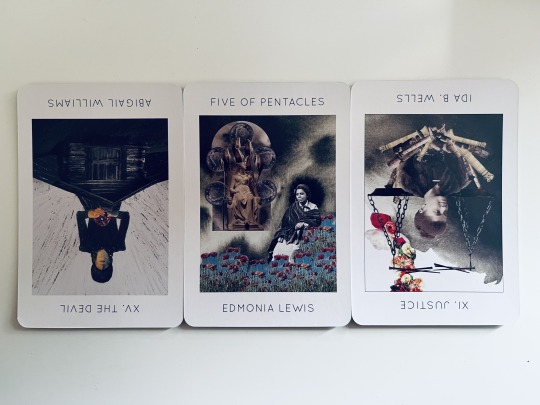
Your cards: The Devil Rx, Five of Pentacles, Justice Rx
Your inner Lilith is trying to tell you the way you view and handle money is letting you into a vulnerable position and instability. There are three ways of interpretation here: 1) You may not view money as the most important thing in the world. So much so, this attitude has led you into poverty; 2) You are a spendthrift, or you spend more than you earn. This too leads you into poverty. 3) You are a sugar baby. Your inner Lilith is saying that the poverty has left you into a very vulnerable position, you may need to rely on others to help you get through the days. You also suffer some injustice because of this. She won't you to change your attitude towards money as soon as possible. So that you can provide for yourself and be autonomy.
<<Pile 3>>
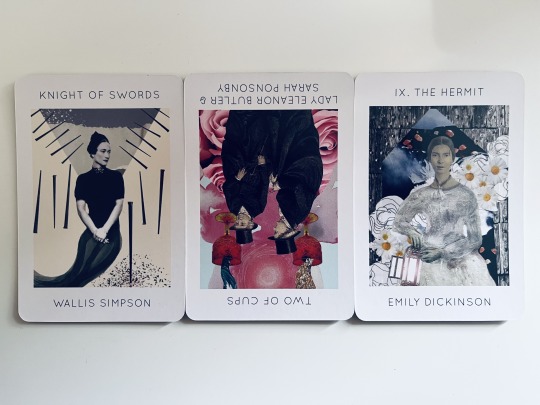
Your cards: Knight of Swords, 2 of Cups Rx, The Hermit
Your inner Lilith is telling you to cut off a toxic relationship as soon as possible. She is also telling you that sometimes it is not bad at all to be on your own. Recently, you have a toxic relationship. This person you are in a relationship with is harsh with words and also degrade your self-worth. Your inner Lilith is telling you to run. Run away from that person. Cut connect with him or her. Go and hide out for a little while. She is saying that being alone is always better than being with someone who isn't worth your company.
#tarotblr#tarot#tarot reading#tarot reader#daily tarot#free tarot readings#free tarot reading#free tarot#divination#oracle#self healing#shadow work#spirituality#astrology#pick a pile#pick a card#pile 1#pile 2#pile 3#pap#pac
119 notes
·
View notes
Text
Ministers of Germany, Brazil, South Africa and Spain: why we need a global tax on billionaires
Finance chiefs say higher taxes for the super-rich are key to battling global inequality and climate crisis

When the governors of the World Bank and the International Monetary Fund convened for the spring meetings last week, it was all about the really big questions. What can the international community do to accelerate decarbonisation and fight climate change? How can highly indebted countries retain fiscal space to invest in poverty eradication, social services and global public goods? What does the international community need to do to get back on track towards reaching the Sustainable Development Goals (SDGs)? How can multilateral development banks be strengthened to support these ambitions?
There is one issue that makes addressing these global challenges much harder: inequality. While the disparity between the richest and poorest countries has slightly narrowed, the gap remains alarmingly high. Moreover, in the past two decades, we have witnessed a significant increase in inequalities within most countries, with the income gap between the top 10% and the bottom 50% nearly doubling. Looking ahead, current global economic trends pose serious threats to progress towards higher equality.
The multidimensional character of inequality is undeniable. Basic services such as healthcare and education are not equally available to all. Often, this inequality of opportunity is handed down from generation to generation. Social origins, gender, race or where people live are some of the factors that play a role in reproducing inequalities. Furthermore, high inequality harms economic development because it inhibits innovation and prevents people from developing their full potential. It is corrosive to democracy and weakens social cohesion. And where social cohesion is weak, there is less support for the structural reforms we will need to undertake in the coming years, such as the necessary transformation towards a net zero economy.
Fortunately, there is a growing global awareness of the importance not only of growth, but of sustainable and equitable growth. Increasing prosperity while tackling inequality within and across countries and generations, including entrenched race and gender inequalities, should not be at odds. Achieving truly sustainable growth lies in balancing three fundamental concerns: economic, social, and environmental.
Continue reading.
#brazil#politics#spain#germany#south africa#economy#fernando haddad#brazilian politics#taxation#Svenja Schulze#Enoch Godongwana#Maria Jesus Montero#Carlos Cuerpo#mod nise da silveira#image description in alt
11 notes
·
View notes